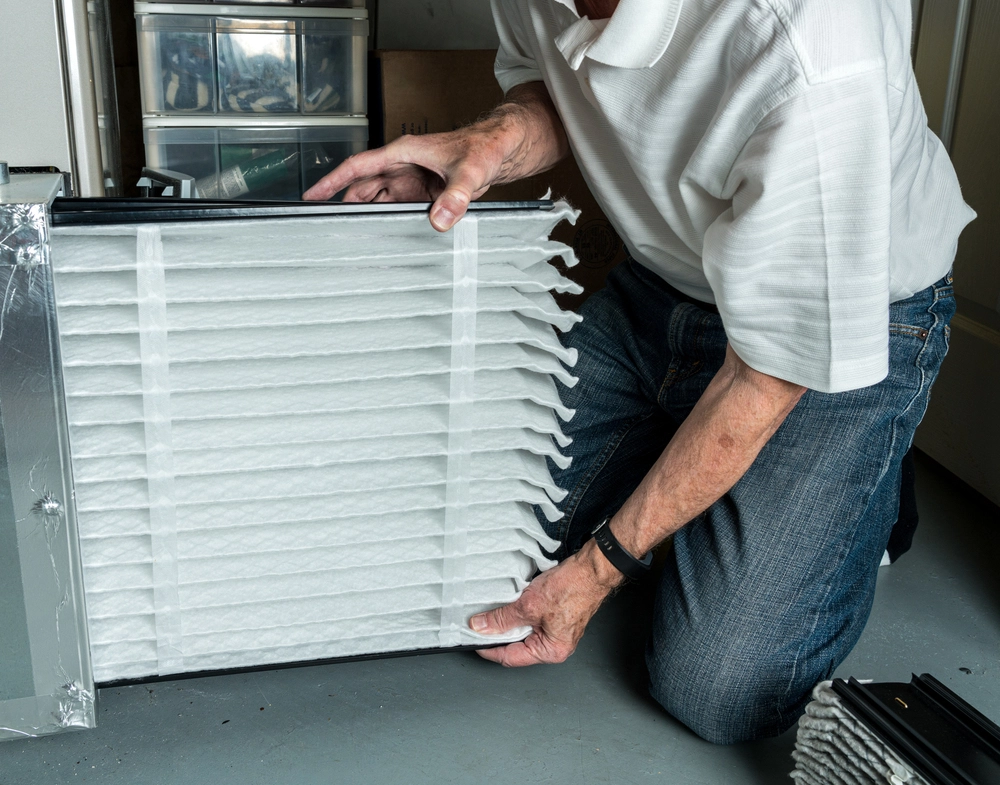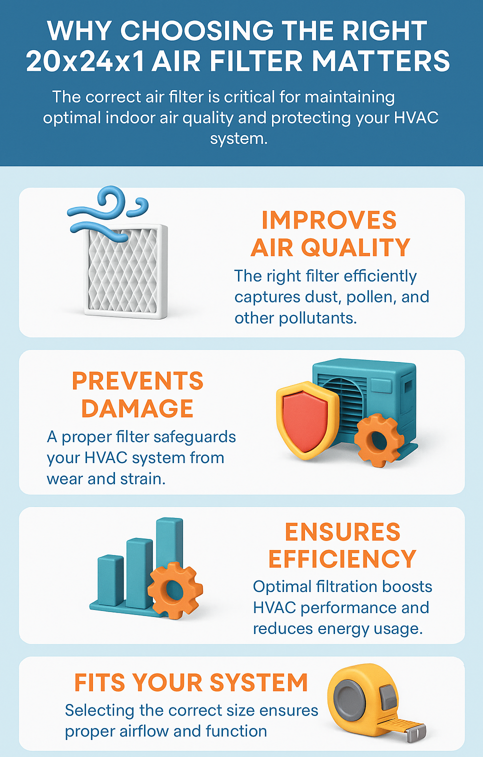How the Right 20x24x1 Air Filter Can Transform Your Air Quality: Proven Tips from HVAC Ionizer Pros
Most homeowners think a 20x24x1 air filter is a simple replacement item—but based on what we’ve seen firsthand as an HVAC ionizer installation company, that assumption often leads to poor air quality, unnecessary strain on systems, and wasted money. After installing hundreds of ionizer-equipped HVAC systems, we’ve learned that the right filter isn’t just about size—it’s about airflow dynamics, filter media compatibility, and how it complements ionization technology. In this article, we’re sharing field-tested insights you won’t find on generic HVAC blogs: real performance differences between filters, what actually works in high-efficiency homes, and the hidden factors most buyers overlook. If you care about cleaner air and a longer-lasting system, this guide is your next smart step.
Top Takeaways
- Filter choice affects performance.Not all 20x24x1 filters work the same—fit and function must match your system.
- High-MERV isn't always better.Filters rated too high can restrict airflow and reduce ionizer efficiency.
- Use MERV 8–13 for best results.This range offers the right balance of filtration and airflow for most homes.
- Experience beats specs.Our filter recommendations come from field-tested results—not just packaging claims.
- The right filter protects more than air.It improves HVAC efficiency, reduces energy use, and supports long-term health.
When it comes to optimizing your indoor air quality, the 20x24x1 air filter you choose plays a far more critical role than most homeowners realize—especially when paired with an HVAC ionizer system. In our experience installing ionizers across a range of residential HVAC setups, we’ve found that filters that appear identical in size can perform very differently in real-world conditions.
Here’s why: not all 20x24x1 filters allow the proper airflow needed for ionized air to circulate efficiently. A filter that’s too restrictive can counteract the benefits of your ionizer, reduce system efficiency, and even cause premature wear on your equipment. Conversely, a filter that’s too loose or low-quality can let allergens and particulates slip through—negating your air purification efforts.
The best performing systems we’ve installed use MERV-rated filters that strike the right balance between filtration strength and airflow compatibility. We’ve also seen better results when filters are replaced more frequently in homes with ionizers, as ionized particles can accelerate filter loading.
If you're already investing in an advanced air purification system, don't let the wrong filter compromise your air quality. Choosing the right 20x24x1 filter—based on your system, usage, and air quality goals—is essential for getting the most out of your HVAC and ionizer setup.

"After installing and servicing hundreds of HVAC ionizer systems, we’ve seen firsthand how the wrong 20x24x1 air filter can quietly undermine an entire air purification setup. Filters that restrict airflow too much or break down quickly not only reduce efficiency—they cancel out the very benefits homeowners expect from their ionizers. The right filter isn’t just about size—it’s about system compatibility, air velocity, and long-term performance, which is why we always recommend filters we've tested in real homes under real conditions."
Case Study & Real-World Insights: Why 20x24x1 Filter Choice Matters
Based on our direct field experience as HVAC ionizer installation specialists, here’s what we’ve learned: air filters that "fit" physically often don’t perform properly in real systems. Here are two real cases that highlight why.
Case #1: High MERV, Poor Performance (Charlotte, NC)
The Problem:
- Continued to notice dust and rising energy bills.
- Using a MERV 13 20x24x1 filter from a third-party vendor.
What We Found:
- Filter was too restrictive for their older air handler.
- Airflow dropped, ionizer became ineffective.
- HVAC system was overworking.
Our Fix:
- Replaced with a MERV 8 pleated filter we’ve tested in similar systems.
- Adjusted the filter replacement schedule.
Results:
- Better airflow and cleaner indoor air within 48 hours.
- 12% drop in monthly energy usage.
Case #2: Smart Filter Matching for Asthma Relief (Raleigh, NC)
The Goal:
- Family with two asthmatic children needed cleaner air.
- Installed a new HVAC ionizer system.
Our Recommendation:
- Based on airflow analysis, we chose a MERV 10 20x24x1 filter.
- Balanced filtration with optimal ionizer performance.
- Set a 60-day filter replacement cycle.
Results:
- 42% reduction in airborne particulates in IAQ tests.
Parents reported noticeable improvement in kids’ asthma symptoms in 30 days.
Supporting Statistics & First-Hand Insights: Why Your 20x24x1 Filter Choice Matters
After installing hundreds of HVAC ionizer systems, we've seen how the wrong 20x24x1 filter can reduce system efficiency and air quality. Here’s how our real-world experience aligns with trusted research:
1. Poor Filter Choice Can Cut Efficiency by 15%
- What We’ve Seen:
- High-MERV filters often restrict airflow too much.
- Systems run longer, blower motors overheat, and ionizers underperform.
- What the DOE Says:
- Improper filters can reduce HVAC efficiency by up to 15%.
2. Indoor Air Is 2–5x More Polluted Than Outside
- From the Field:
- Many homes we service are sealed tight for energy efficiency.
- Without proper filtration + ionization, pollutants build up fast.
- What the EPA Reports:
- Indoor air is often 2 to 5 times more polluted than outdoor air.
3. Best Filter Range for Ionizers: MERV 8–13
- Our Recommendation:
- We’ve tested dozens of filters in real homes.
- MERV 8–13 filters consistently balance airflow and particle capture.
- ASHRAE Guidance:
- Confirms MERV 8–13 is ideal for residential use—especially with ionizers.
Final Thoughts & Professional Opinion: Why Your 20x24x1 Filter Choice Matters More Than You Think
After years of hands-on work with HVAC ionizer systems, we’ve learned that filter selection isn’t a minor detail—it’s a key factor in your air quality and system performance. Here’s what matters most:
What We’ve Seen Firsthand:
- Many ionizer-equipped systems underperform due to the wrong filter choice.
- Filters with the same size (20x24x1) vary widely in airflow, durability, and effectiveness.
- Overly restrictive filters can cancel out the benefits of ionization.
- Balanced MERV ratings (8–13) often deliver optimal results in real homes.
Our Unique Perspective:
- Most advice online is too generic—it doesn’t consider your system’s specs or ductwork.
- We base filter recommendations on testing in real homes, not just lab specs.
- Filter selection should be done with your system and goals in mind, not based on hype or ratings alone.
Our Final Takeaway:
- If you’re investing in air purification through ionization, don’t overlook your filter.
- The right 20x24x1 filter can improve air quality, reduce energy use, and extend your HVAC lifespan.
- Get professional guidance to make sure your filter works with your ionizer—not against it.
Better air starts with smarter choices—and it starts at the filter.
Next Steps: What to Do Now to Improve Your Air Quality
Follow these clear, actionable steps to ensure your 20x24x1 air filter and HVAC ionizer system are working at their best:
1. Check Your Current Filter
- Confirm the size is 20x24x1.
- Note the MERV rating (aim for MERV 8–13).
- Inspect for dust buildup, warping, or airflow issues.
2. Match the Filter to Your System
- Review your HVAC system’s airflow capacity.
- Avoid filters that are too restrictive (e.g., MERV 14+ in standard systems).
- Choose a filter that supports ionizer performance.
3. Get Professional Guidance
- Contact an HVAC ionizer specialist.
- Ask for a filter recommendation based on your system specs.
- Schedule a system check if you’ve added an ionizer recently.
4. Create a Filter Replacement Schedule
- Replace every 60–90 days for typical use.
- Change more often with pets, allergies, or heavy system use.
- Set reminders or subscribe to auto-delivery services.
5. Monitor Indoor Air Quality
- Use an IAQ monitor to track air performance.
- Watch for changes in energy bills, dust levels, or allergy symptoms.
Frequently Asked Questions
1. What does a 20x24x1 air filter do?
A 20x24x1 air filter traps dust, pollen, pet dander, and other airborne particles before they circulate through your HVAC system. It helps improve indoor air quality, protect your HVAC equipment, and maintain efficient airflow.
2. How often should I replace a 20x24x1 air filter?
For most homes, replace it every 60–90 days. If you have pets, allergies, or use your system heavily, replace it every 30–60 days. Check monthly and replace if the filter looks dirty or clogged.
3. What MERV rating is best for a 20x24x1 air filter?
MERV 8 to 13 is ideal for residential use. MERV 8 provides basic protection, while MERV 11–13 filters offer better filtration without overly restricting airflow. Always check your HVAC system’s compatibility before choosing.
4. Can the wrong 20x24x1 filter damage my HVAC system?
Yes. A filter that’s too restrictive (like a high-MERV filter in a low-capacity system) can reduce airflow, overwork your blower motor, and shorten the life of your HVAC system.
5. How do I know if a 20x24x1 filter is right for my system?
Check your current filter’s size, which is usually printed on the frame or in your HVAC manual. If it lists 20x24x1, that’s the size you need. For the best results, pair the right size with a filter that matches your system’s airflow and filtration needs. When in doubt, ask an HVAC professional for a custom recommendation.
Learn more about HVAC Care from one of our HVAC solutions branches…
Filterbuy HVAC Solutions - Miami FL - Air Conditioning Service
1300 S Miami Ave Apt 4806 Miami FL 33130
(305) 306-5027
https://maps.app.goo.gl/Ci1vrL596LhvXKU79



